Carprofen is a commonly used pain relief medication for cats, known for its effectiveness as a non-steroidal anti-inflammatory drug (NSAID).
This medication can help manage inflammation and alleviate pain, making it a valuable option for cats dealing with chronic conditions or recovering from surgery.
As a pet owner, understanding how carprofen works and its potential effects on your cat is essential for making informed decisions about their health and well-being.
While carprofen offers significant benefits, it is also crucial to be aware of possible side effects and interactions with other medications.
Monitoring your cat’s reaction to the drug and discussing any concerns with your veterinarian can help ensure safe and effective use.
Exploring alternatives may also provide additional options tailored to your cat’s specific needs.
In this article, you’ll discover everything you need to know about carprofen for cats, including its advantages, risks, and proper administration practices.
Whether you’re considering this medication for the first time or looking for ways to optimize your cat’s pain management plan, valuable insights await.
Key Takeaways
- Carprofen is an effective NSAID for managing pain in cats.
- Be mindful of potential side effects and interactions with other medications.
- Consult your veterinarian for personalized advice on your cat’s treatment.
What Is Carprofen?

Carprofen is a non-steroidal anti-inflammatory drug (NSAID) primarily used in veterinary medicine.
It serves as an analgesic and anti-inflammatory medication, helping to manage pain and inflammation in animals.
Although it is FDA approved for use in dogs, its application in cats tends to be off-label.
Carprofen in Veterinary Medicine
In veterinary practice, carprofen is often used to treat pain associated with conditions like osteoarthritis or post-surgical recovery.
While it is effective for dogs, its use in cats is more controversial.
Cats are more sensitive to side effects of NSAIDs, raising concerns among veterinarians.
When considering carprofen for your cat, dosage is crucial.
The typical recommended dose ranges from 1-2 mg per pound of body weight.
Careful monitoring for adverse reactions is essential.
It can also interact with other medications, so discussing your cat’s health history with your vet is vital before starting treatment.
Mechanism of Action
Carprofen works by blocking certain enzymes that produce prostaglandins, which are chemicals responsible for inflammation, pain, and fever.
Specifically, it inhibits COX-1 and COX-2 enzymes, reducing inflammation and alleviating pain.
By lowering the levels of prostaglandins, carprofen helps in managing inflammatory responses in your pet.
This makes it effective not only as an anti-inflammatory but also as an analgesic.
While its antipyretic effects can help reduce fever, the key focus remains on addressing pain and inflammation.
Understanding how carprofen works can help you weigh its benefits and risks for your cat.
Always consult your veterinarian for tailored advice on medication options.
Benefits of Carprofen for Cats

Carprofen offers several advantages for cats dealing with pain and inflammation.
Its effectiveness as both an analgesic and anti-inflammatory medication can significantly enhance your cat’s quality of life.
Here’s a closer look at how carprofen can help your feline friend.
Pain Management
When your cat experiences pain, whether from osteoarthritis or injury, carprofen serves as an effective pain reliever.
This nonsteroidal anti-inflammatory drug (NSAID) works by blocking certain enzymes that contribute to the sensation of pain.
Administering the recommended dose of 4 mg/kg helps ease discomfort, allowing your cat to engage in more activities without restriction.
It’s important to monitor your cat’s response to treatment.
Some cats show remarkable improvement, becoming more active and playful.
By effectively managing pain, you enhance your cat’s overall well-being and emotional state.
Seeking veterinary guidance before starting treatment can ensure the proper use and dosage for your furry friend.
Anti-Inflammatory Effects
Carprofen also possesses strong anti-inflammatory properties that can be beneficial for managing chronic conditions in cats.
Conditions like osteoarthritis can lead to joint inflammation, causing discomfort and decreased mobility.
By targeting the inflammation, carprofen can reduce swelling and improve joint function.
Administering carprofen regularly can lead to a noticeable improvement in your cat’s activity levels.
Less inflammation means your cat may experience less pain and stiffness, allowing for a more active lifestyle.
Always consult with your veterinarian to establish a long-term treatment plan tailored to your cat’s specific needs.
Postoperative Pain Relief
After surgery, your cat may experience significant discomfort.
Carprofen is often prescribed to provide analgesic effects that help manage postoperative pain effectively.
By alleviating pain, carprofen facilitates better recovery, enabling your cat to resume normal activities sooner.
Using carprofen in a postoperative context aids in managing inflammation as well.
Reduced inflammation around surgical sites promotes healing and minimizes complications.
This dual action makes carprofen a valuable tool in postoperative care for cats, ensuring a more comfortable recovery.
Potential Side Effects and Risks
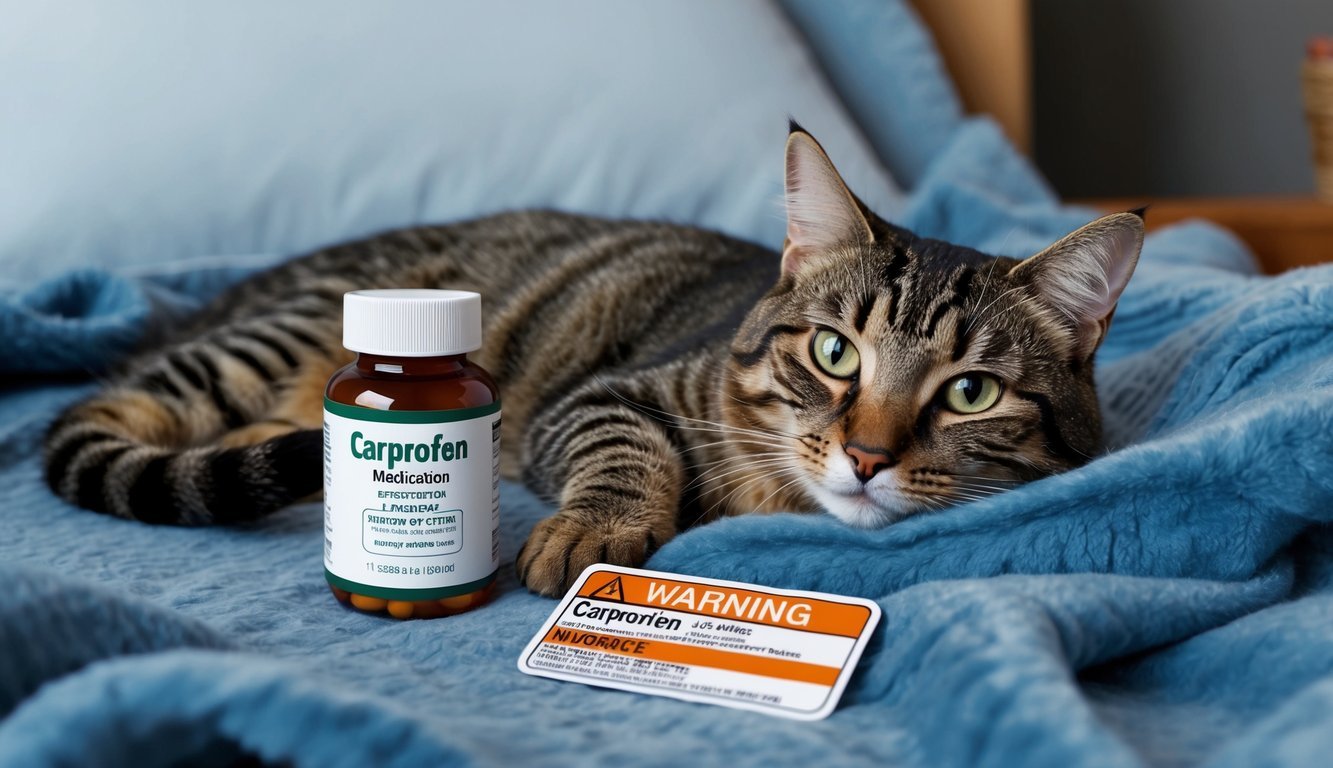
When considering carprofen for your cat, it’s important to be aware of the potential side effects and risks associated with its use.
Some of the most notable concerns involve gastrointestinal issues, potential liver and kidney damage, and the risk of seizures.
Gastrointestinal Problems
One of the most common side effects of carprofen is gastrointestinal upset.
You might notice your cat experiencing vomiting or diarrhea.
These issues generally occur in less than 2% of cases but can be distressing for both you and your pet.
If your cat shows signs of gastrointestinal discomfort, it’s crucial to contact your veterinarian promptly.
Keeping an eye on their eating and drinking habits can help you identify any changes.
In some cases, adjusting the dosage or switching to another NSAID may be necessary to mitigate these problems.
Liver and Kidney Damage
Carprofen can pose risks to your cat’s liver and kidneys.
While it is less likely to cause renal toxicity compared to some other medications, caution is still warranted.
Regular monitoring through blood tests is often recommended for cats on long-term carprofen therapy, especially if they have pre-existing conditions.
Signs of potential liver damage include increased urination, lethargy, or changes in appetite.
If you notice any such symptoms, consult your veterinarian immediately.
Risk of Seizures
Although rare, there is a potential risk of seizures associated with carprofen.
These events may occur due to the medication interacting with your cat’s existing health conditions or other medications.
If your cat has a history of seizures or other neurological issues, discuss these concerns with your veterinarian before starting carprofen.
Be alert for any unusual behaviors, such as twitching or sudden loss of coordination, as these may indicate a seizure.
Always report these observations to your veterinarian for appropriate evaluation and management.
Usage and Administration
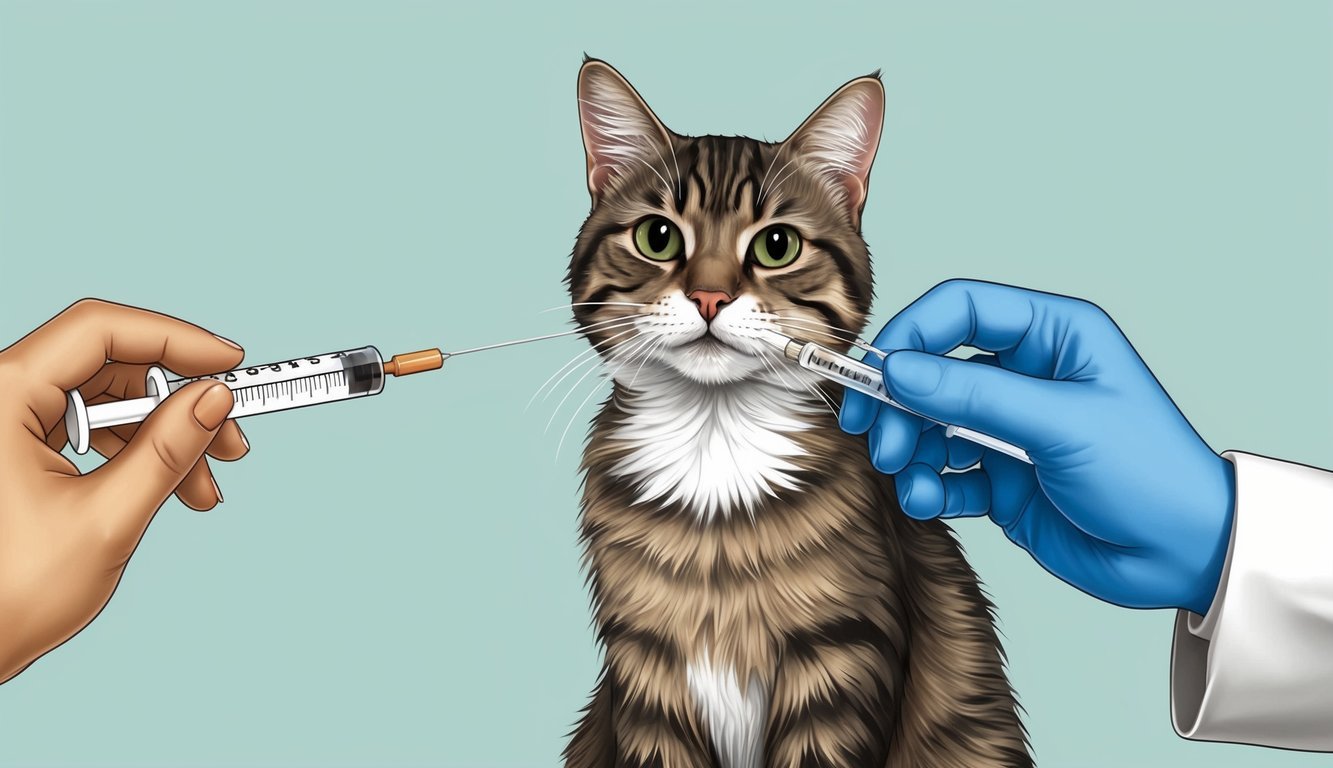
Carprofen is a non-steroidal anti-inflammatory drug (NSAID) used for pain relief in cats.
Understanding how to properly prescribe, dose, and monitor this medication is crucial to ensure the safety and effectiveness of treatment.
Prescribing Carprofen
When it comes to prescribing carprofen for your cat, it’s important to note that this medication is not FDA-approved for feline use.
Veterinarians may prescribe it off-label, based on their clinical judgment and your cat’s specific needs.
Always consult your veterinarian before starting carprofen.
They will assess your cat’s health history and consider factors like age and existing medical conditions to determine if carprofen is an appropriate choice.
Never administer carprofen to your cat without a vet’s recommendation.
Dosage and Administration
The recommended dosage of carprofen for cats is typically 4 mg/kg of the cat’s weight.
It’s available in both oral and injectable forms, which can be chosen based on discretion and your cat’s condition.
Oral Administration:
- Frequency: Follow your vet’s instructions.
- Method: Mix with food or offer as a treat for easier intake.
Injectable Form:
- This is generally used for immediate pain relief in more acute situations.
Make sure to closely follow your veterinarian’s guidelines on the dosage to prevent potential side effects.
Monitoring and Adjustments
Monitoring is key when your cat is on carprofen.
Watch for any signs of adverse reactions, such as vomiting, diarrhea, or changes in appetite.
Regular veterinary check-ups may include blood tests to assess liver function, as cats can have a limited capacity to process certain drugs.
If your cat is on carprofen for an extended period, adjustments to the dosage may be necessary.
Based on your cat’s response to the medication, your vet may suggest increasing or decreasing the dose.
Always communicate openly with your vet about your cat’s condition and any side effects that arise.
Alternatives and Comparisons
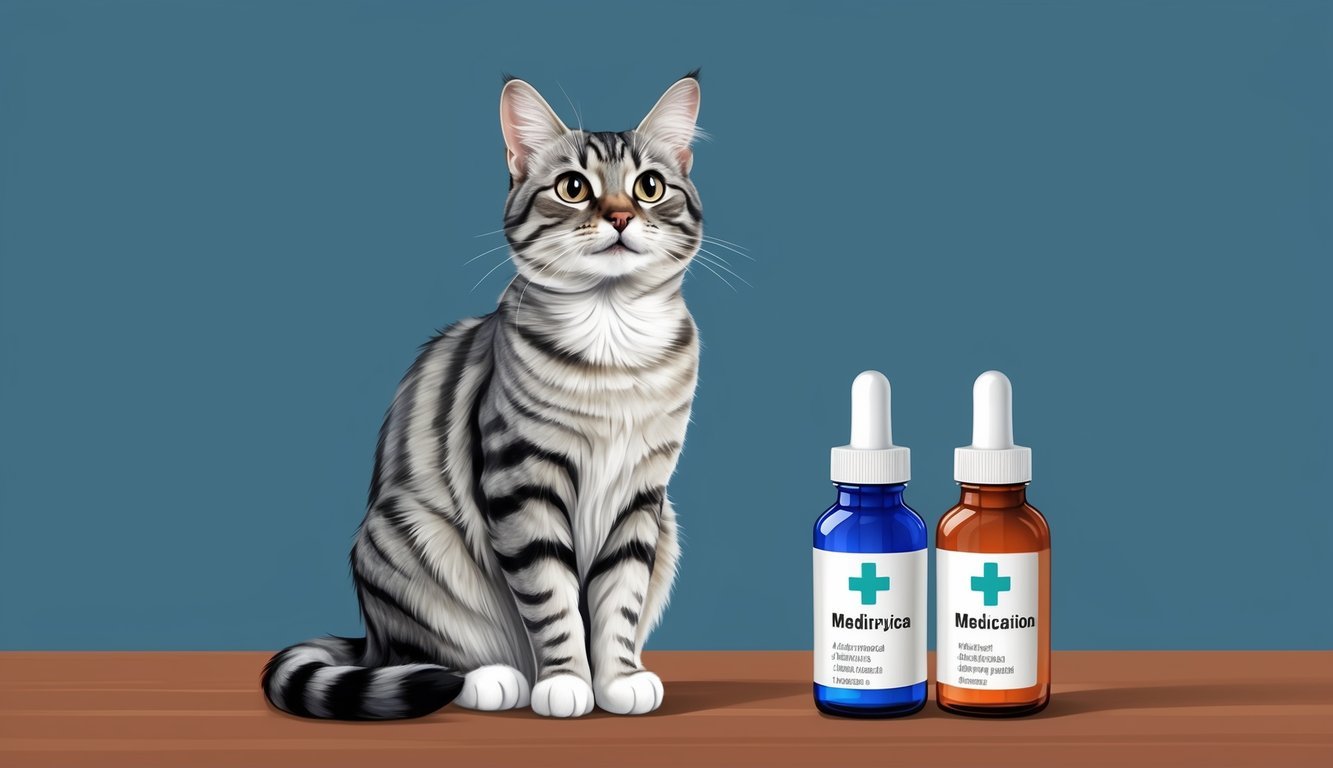
When considering pain management options for your cat, it’s important to look at various medications like meloxicam and other nonsteroidal anti-inflammatory drugs (NSAIDs).
Each has unique properties that may make one more suitable than another.
Meloxicam Versus Carprofen
Meloxicam is commonly used in cats for pain relief and inflammation.
It’s often administered in a single dose due to its long half-life.
Some studies suggest that meloxicam can be effective for osteoarthritis and postoperative pain.
On the other hand, carprofen is typically dosed at 4 mg/kg and is particularly effective for acute pain.
While both medications are NSAIDs, carprofen may work faster for immediate discomfort, whereas meloxicam can be beneficial for chronic conditions.
It’s crucial to monitor for side effects, especially gastrointestinal issues, with both options.
Other NSAIDs and Analgesics
In addition to meloxicam and carprofen, there are other NSAIDs and analgesics available for your cat.
Drugs like aspirin and etodolac can offer pain relief but often carry a higher risk of side effects.
Some veterinarians may also consider adjunct therapies, such as gabapentin, which can be helpful for neuropathic pain.
Always consult your vet to determine the most appropriate choice, considering your cat’s specific condition and health history.
Regular monitoring while on these medications is essential for safety.
Interactions and Contraindications
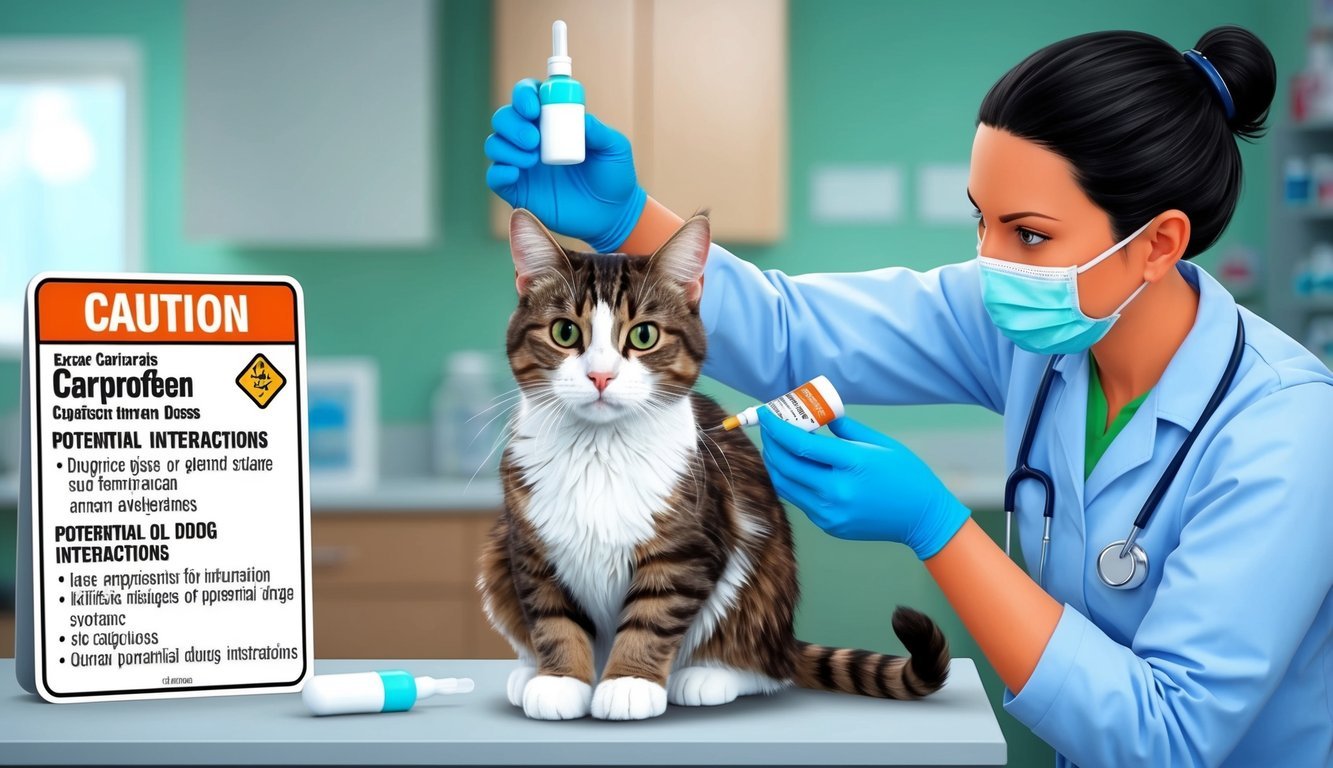
When considering carprofen for your cat, it’s vital to be aware of potential interactions with other medications and specific health conditions that may worsen with its use.
Understanding these factors can help you ensure your cat’s safety while managing pain effectively.
Drug Interactions
Carprofen can interact with several types of medications.
Some key interactions to note include:
- Antibiotics: Certain antibiotics may not work well with carprofen. Always consult your vet about any antibiotics your cat might take.
- Glucocorticoids: Combining carprofen with glucocorticoids like prednisolone can increase the risk of gastrointestinal issues, including ulcers. This combination should typically be avoided unless specifically directed by a veterinarian.
- Other NSAIDs: Using multiple non-steroidal anti-inflammatory drugs can heighten the chance of side effects and isn’t recommended.
Make sure to keep your vet informed about all medications your cat is taking, including supplements.
When to Avoid Carprofen
There are specific situations where using carprofen isn’t advisable.
If your cat has a history of:
- Gastrointestinal Issues: Conditions like ulcers or gastritis can worsen with carprofen due to potential side effects like perforation or bleeding.
- Liver or Kidney Problems: Cats with pre-existing liver or kidney conditions are at a higher risk for toxicity. Carprofen is metabolized in the liver, and impaired function can lead to serious complications.
Always prioritize your cat’s current health status when considering this medication.
Your veterinarian can provide you with the most accurate advice tailored to your cat’s needs.
Managing Chronic Conditions
Managing chronic conditions in cats requires a thoughtful approach to pain management.
You can make better decisions regarding your cat’s treatment by understanding how these conditions affect them.
Osteoarthritis in Cats
Osteoarthritis is a common issue in older cats.
It causes joint pain and stiffness, impacting your cat’s mobility and quality of life.
You might notice your cat hesitating to jump or becoming less active.
Signs include:
- Decreased activity
- Difficulty grooming
- Changes in behavior, like irritability
Treatment often involves carprofen, which helps reduce inflammation and provide pain relief.
The typical dose is 4 mg/kg of your cat’s weight, but you need to consult your veterinarian for personalized dosing.
Regular check-ups help monitor your cat’s condition and adjust treatment as needed.
Long-Term Pain Management
Long-term pain management may incorporate various strategies.
These could include medications, physical therapy, and weight management.
A combination approach often yields the best results.
In addition to carprofen, gabapentin may also be used to manage chronic pain effectively.
Recommended doses start at 2 to 10 mg/kg every 8-12 hours, adjusting as necessary.
Consider dietary supplements such as omega-3 fatty acids, which can support joint health.
Regular exercise, tailored to your cat’s ability, can improve mobility and overall well-being.
Always consult with your veterinarian to create a comprehensive pain management plan that is right for your cat.
Consistent monitoring and adjustments can make a significant difference in your cat’s comfort and happiness.
Considerations for Senior Cats
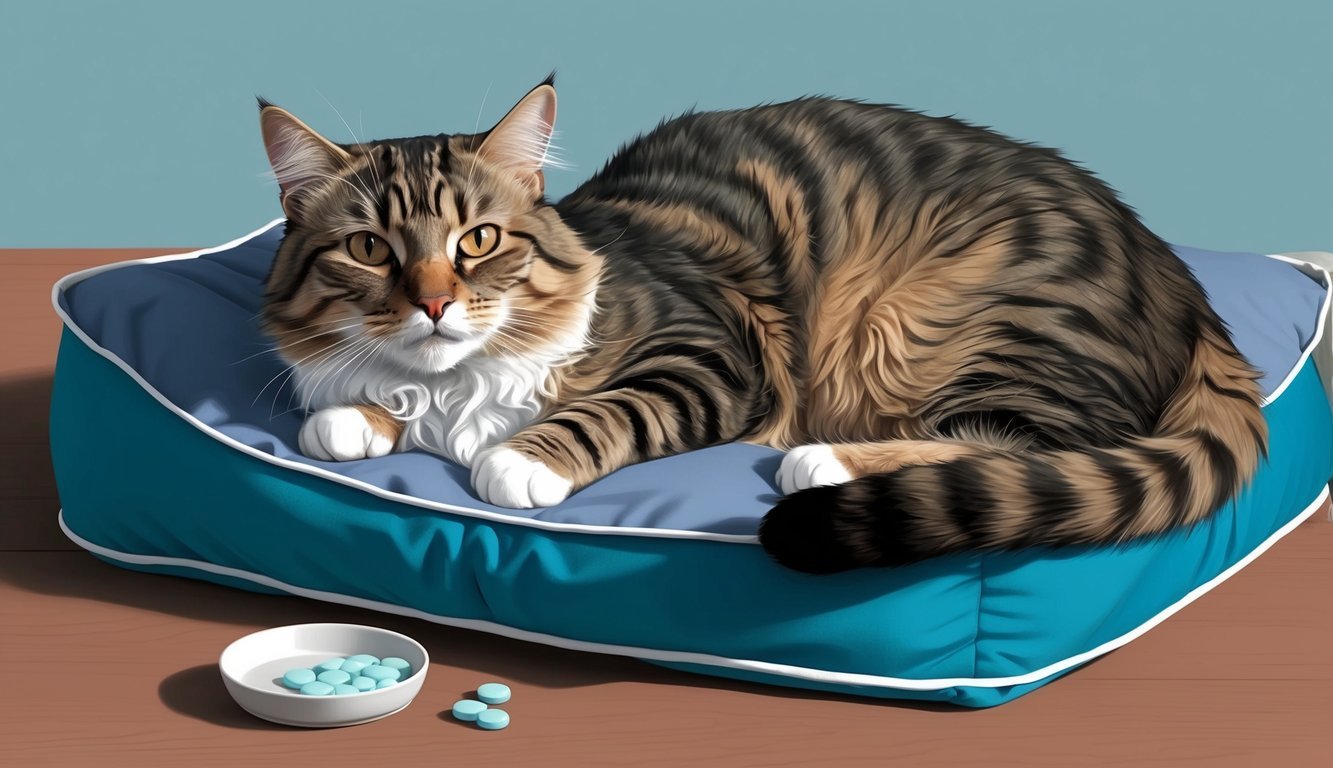
Understanding the specific needs of senior cats is crucial, especially when it comes to medications like carprofen.
Their aging bodies may react differently, necessitating careful monitoring and adjustments.
Age-Related Sensitivity
As cats age, their physiological systems change, making them more sensitive to medications.
This sensitivity can result in altered drug metabolism and an increased likelihood of side effects.
-
Dosage Adjustments: Your vet may recommend starting with a lower dose of carprofen for senior cats. It’s essential to monitor your cat closely for any signs of adverse reactions.
-
Pre-existing Conditions: Cats with underlying health issues, like liver or heart conditions, may be more vulnerable. Regular veterinary check-ups are vital for adjusting treatment plans as needed.
-
Signs to Watch For: Keep an eye out for signs of discomfort, gastrointestinal upset, or changes in behavior after starting treatment.
Chronic Kidney Disease
Chronic kidney disease (CKD) is common in older cats.
This condition requires special consideration regarding the use of carprofen, as it may exacerbate kidney issues.
-
Increased Risk: Nonsteroidal anti-inflammatory drugs, like carprofen, may pose a risk for cats with impaired kidney function. Consult your veterinarian before starting any NSAID.
-
Monitoring Kidney Function: Regular blood and urine tests should be performed to monitor your cat’s kidney health. This will help determine if carprofen is a suitable pain management option.
-
Alternative Pain Relief: If your cat has CKD, your vet may suggest alternative pain relief strategies that are safer and tailored to your cat’s health status.
Carprofen Brand Names

Carprofen is marketed under several brand names, each having specific formulations and dosing guidelines.
Familiarizing yourself with these names can help in ensuring you are using the correct medication for your cat.
Carprieve and Novox
Carprieve is a common brand of carprofen that is specifically formulated for veterinary use.
It is available in chewable tablet and injectable forms.
The chewable option can be easier for some cats to take, particularly if they are picky eaters.
Novox is another brand that offers similar formulations and dosing as Carprieve.
Both brands are designed to manage pain and inflammation in cats effectively.
Always consult your veterinarian to determine which brand may be more suitable for your cat, considering your cat’s health status and treatment needs.
Vetprofen and Quellin
Vetprofen is yet another brand name for carprofen.
This option may be preferred for certain veterinary practices.
It is also available in different strengths and forms, making it easy to tailor to your cat’s needs.
Quellin is a unique chewable carprofen option that comes flavored to make administration easier.
This may appeal to cats that typically resist taking medications.
Always follow your vet’s guidance regarding dosage and frequency.
Knowing which brand to ask for can make a difference in your cat’s treatment plan.
Recognizing Overdose and Adverse Reactions
Being aware of the potential for overdose and adverse reactions is crucial when administering carprofen to your cat.
Understanding the symptoms of overdose and knowing how to respond can make a significant difference.
Symptoms of Overdose
Signs of carprofen overdose in cats can be serious and may include:
- Gastrointestinal Issues: Vomiting, diarrhea, or lack of appetite.
- Lethargy: Unusual tiredness or lack of energy.
- Behavior Changes: Increased agitation or unusual vocalization.
More severe symptoms can also arise, such as:
- Renal Problems: Increased thirst and urination may indicate kidney stress.
- Hepatic Issues: Jaundice (yellowing of the skin and eyes) could signal liver toxicity.
Pay attention if your cat displays any of these symptoms, especially if they have recently ingested more than the recommended dosage.
Prompt action could be critical.
Responding to Adverse Effects
If you notice any adverse effects after giving carprofen, immediate action is important.
- Contact Your Veterinarian: Reach out right away to discuss symptoms.
- Withhold the Medication: Do not administer more carprofen until a vet advises you.
- Monitor Your Cat: Keep a close eye on your cat’s behavior and symptoms.
In cases of severe reactions, you may need to rush your cat to an emergency veterinary clinic.
Being proactive and attentive to any changes helps manage your cat’s health effectively.
Frequently Asked Questions
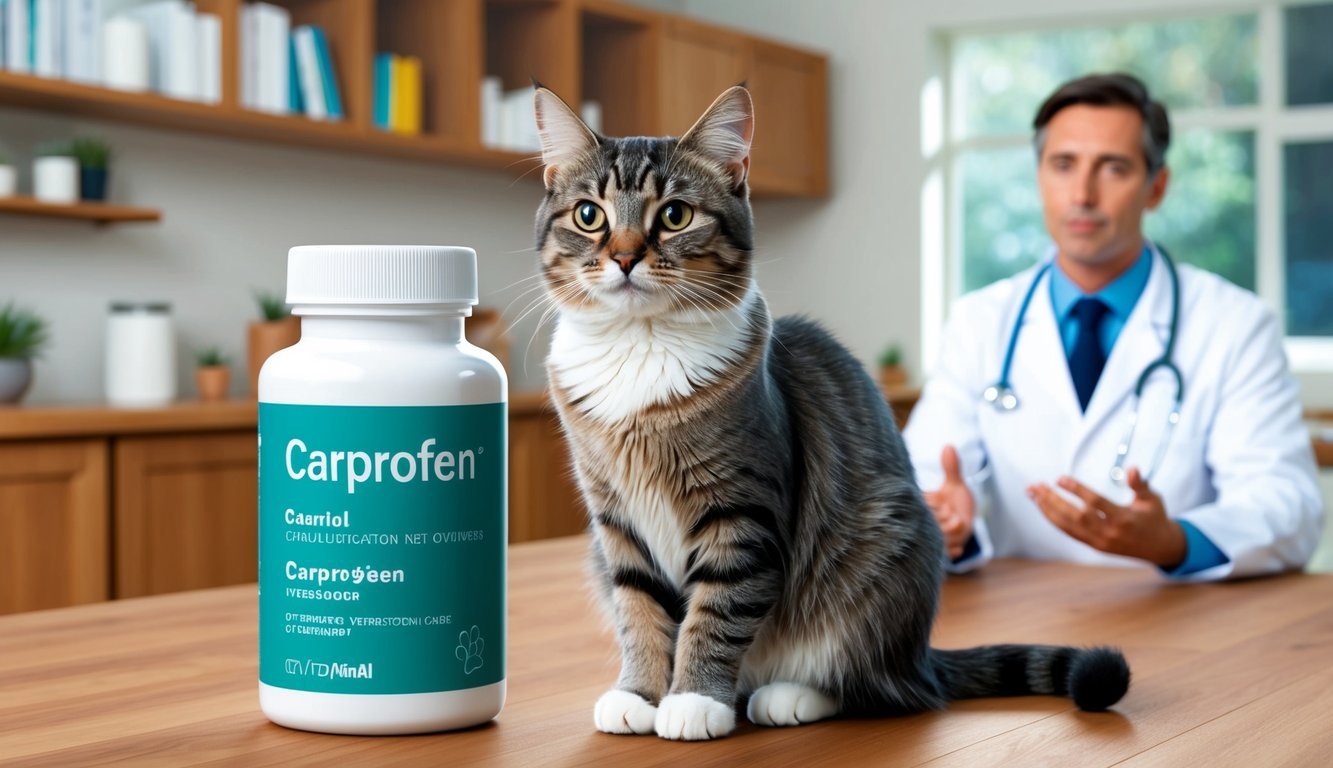
When considering carprofen for your cat, you likely have several questions about its safe use and potential effects.
This section addresses common inquiries regarding dosage, side effects, toxicity signs, and alternative treatments.
How much carprofen can I give my cat?
The recommended dosage for carprofen in cats is typically 4 mg per kilogram of their body weight.
Always consult your veterinarian for precise instructions tailored to your cat’s specific health needs and conditions.
Are there any side effects when a cat takes carprofen?
Yes, there can be side effects when a cat takes carprofen.
Common side effects may include gastrointestinal issues, liver damage, and kidney problems.
Regular monitoring is essential to catch any adverse effects early.
Can I refer to a dosage chart for administering carprofen to my cat?
While dosage charts can provide general guidance, it’s crucial to consult your veterinarian before administering carprofen.
Each cat is unique, and your vet can provide the most accurate dosage based on your cat’s condition.
What are the signs of carprofen toxicity in cats?
Signs of carprofen toxicity may include vomiting, diarrhea, lethargy, or loss of appetite.
If you notice these symptoms, contact your veterinarian immediately for further evaluation and assistance.
For how long do the effects of carprofen last in cats?
The effects of carprofen can last between 8 to 12 hours after administration.
It’s important to follow your veterinarian’s guidelines regarding the frequency of dosing to ensure optimal effectiveness.
What are the anti-inflammatory alternatives to carprofen for a cat?
If carprofen is unsuitable for your cat, some alternatives include ketoprofen, meloxicam, or natural remedies.
Discuss these options with your veterinarian to find the best fit for your cat’s specific situation.

